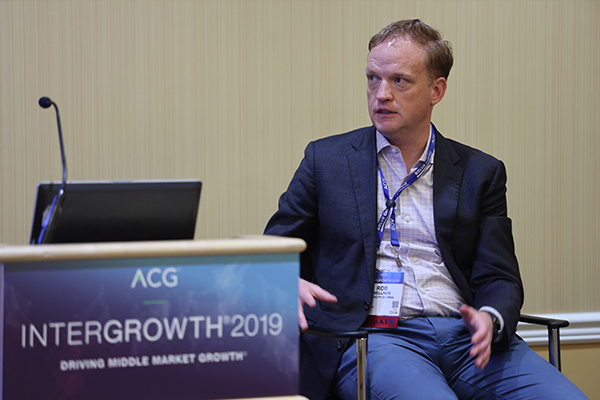Finding Growth Abroad
During a breakout session sponsored by Velocity Global at ACG's InterGrowth conference, panelists outlined four areas institutional investors should consider when expanding their portfolio companies overseas.

As the global marketplace becomes more interconnected, international expansion can help companies achieve greater growth than if they operated in their home country alone. But there isn’t just one way to expand abroad, and understanding the available options can help investors mitigate risk.
“I would say that almost every one of our companies, even at an early stage of funding, has thought about internationalization, but the techniques they’re using to expand can be a hodgepodge,” said John Pennett, a partner in the Life Sciences and Technology Group of accounting and advisory firm EisnerAmper, during a panel session titled “International Growth, Accelerated: Reduce Operational Risk and Increase ROI” at ACG’s InterGrowth conference.
To cut down on the confusion, Pennett and fellow panelist Rob Wellner, senior vice president of sales at employment solutions provider Velocity Global, outlined four areas for institutional investors to consider when helping their portfolio companies grow internationally.
Establishing a Legal Entity
Private equity investors might assume the best way to deploy funds abroad is to establish a foreign subsidiary immediately, but that process can take as little as a week in some countries and up to three months in others, according to Wellner, whose firm sponsored the panel discussion.
“If investors don’t want to spend several months waiting to establish a presence, they might want to consider other options,” he said.
PE investors that are undeterred by lengthy processing time should conduct thorough due diligence to avoid the consequences of an unforeseen exit. “If you get the market wrong or you see that those employees you’ve hired aren’t meeting your company metrics, unwinding and pulling out can become pretty burdensome,” Wellner said.
Investors should also be aware that a foreign office will incur increased compliance costs because it creates a taxable presence and triggers tax reporting requirements in both the U.S. and the host country. Yet in Wellner’s view, the costs might be worth it if establishing a foreign subsidiary can increase the return on investment.
Nonresident Employer

Setting up as a nonresident employer can be a less expensive and simpler alternative to establishing a foreign subsidiary, but this option comes with limited functionality.
While common throughout Europe, nonresident employers are used by companies primarily for market analysis, and employment typically lasts only a few months.
When companies do establish as a nonresident employer, it’s usually as a stopgap measure before creating a more permanent establishment, according to Wellner. For that reason, along with complex compliance rules, this employment model is rarely used. “It’s like one of those yetis, you know? They might exist but I’ve never actually seen it,” Pennett said.
Independent Contractors
Independent contractors are one of the fastest and most flexible ways to establish a foreign presence, but working with contractors outside the U.S. comes with some caveats.
For one, workers in another country who aren’t fully vested employees of the parent company can feel isolated and undervalued, which can lead to high rates of turnover, Wellner said.

There is also the risk of legal complications. Pennett recalled an instance where one of his client companies hired independent contractors out of their office in Germany as a low-cost labor solution, but that backfired when a contractor sued for severance after being terminated. Because severance law in Germany is complex, the case became costly and prompted the company to shut down its German office. “It was so much money that it wasn’t worth the effort,” Pennett said.
Employer of Record or PEO
Establishing a foreign presence as an employer of record—also known as a PEO, or professional employer organization—can offer companies a fast and flexible solution.
In most instances, a PEO has the same relationship with an employee as if the company had a legal presence.
Employees are usually paid through the PEO and payroll is handled locally, which means the home company doesn’t have to know the particularities of employment law in the country where it’s operating.
As part of its suite of services, Velocity Global offers an International PEO. According to Wellner, the PEO method works best for a company that has few fixed assets. “It’s not really an option if you want to set up a factory.”
For these reasons, PEOs make a good vehicle for institutional investors looking to stake a claim outside the U.S. and scale up quickly, he added. “It provides most of the items you’re looking for when you want to develop human capital abroad.”

Benjamin Glick is ACG Global’s marketing and communications associate.


